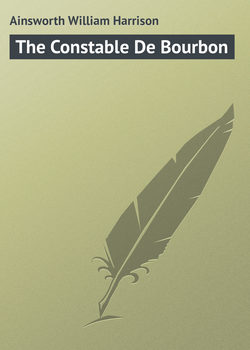Читать книгу The Constable De Bourbon - Ainsworth William Harrison - Страница 9
BOOK II. – THE FLIGHT
IV. THE COMTE DE MAULEVRIER
ОглавлениеBy the time the Constable had returned to the Château de Moulins, François had completed his preparations for the war in Italy. Bonnivet, at the head of a large force, had already crossed the Alps, and Lautrec and Lescun had been sent to defend the frontiers from the Spaniards.
Having paid a visit to the cathedral of Saint Denis, for the purpose of solemnly invoking the aid of the patron saint of France, and offered up his devotions in the Sainte Chapelle; having also publicly appointed his mother Regent of the kingdom during his absence, he set out with a large attendance, comprising the flower of the French chivalry.
His march rather resembled a journey of pleasure than a warlike expedition, inasmuch as he was accompanied by the Comtesse de Chateaubriand and several other beautiful dames. The royal cortège was preceded by the Grand-Master of France at the head of two thousand lansquenets, and followed by the Duke de Longueville, with a large troop of horse.
Proceeding by easy stages, François had reached Saint-Pierre-le-Moutier, which was within half a day’s journey of the Château de Moulins, and was passing the evening festively, as was his wont, when he was disturbed by the sudden arrival of Louis de Brézé, Comte de Maulévrier, grand senesçhal and lieutenant-general of Normandy, whom we have already mentioned as the husband of the beautiful Diane de Poitiers, daughter of the Comte de Saint-Vallier.
François at once granted him the private interview he desired, and, as soon as they were alone, Maulévrier said, “Sire, prepare yourself for bad tidings. What I have to tell you I fear will arrest your expedition to Italy. I come to warn your majesty of a most formidable conspiracy, the object of which is to deprive you of your kingdom, and perhaps of your life. Fortunately, the discovery has been made before the mine could be sprung. Fortunately, also, for the purposes of justice, the chief contriver of the plot is in your majesty’s power.”
“There is only one person in the kingdom who could contrive such a plot,” replied the king. “But I do not think the Constable de Bourbon capable of a crime so heinous.”
“The Constable de Bourbon is guilty of the blackest treason, sire,” replied Maulévrier. “He has allied himself to the Emperor and to the King of England, and while an invasion is made upon your kingdom by those two sovereigns, he designs to break out into revolt. This is no idle accusation, sire. I will give proofs of the truth of what I assert. Two young Norman seigneurs of high honour and distinction, Matignon and D’Argouges, with whose names your majesty must be familiar, met Bourbon’s confidential agent, Lurcy, by appointment at Vendôme. At this meeting Lurcy disclosed to them the whole conspiracy, and offered them the government of Normandy and other high posts, on the condition that they should assist the disembarkation of the English on our coasts. The treasonable offer filled the two loyal gentlemen with horror, and they indignantly rejected it, but, as they had been sworn to secresy, they could not reveal it. However, they confessed the conspiracy to the Bishop of Lisieux, who, appalled at its enormity, at once made it known to me, and I have not lost a moment in warning your majesty of the danger with which you and your loyal subjects are threatened. Heaven be praised, you have hitherto escaped!”
Astounded by this terrible communication, to which he would willingly have refused credit, the king remained for some time buried in reflection. At length he said:
“Comte de Maulévrier, I charge you not to let fall a word in regard to this conspiracy. I will give Bourbon a last chance. I will see him to-morrow at the Chateau de Moulins.”
Maulévrier would have remonstrated, but perceiving that the king was resolved, he said no more.
François, however, did not neglect needful precautions. Without assigning any reason for the step, he immediately despatched an order to the grand-master, who was a day in advance of the royal cavalcade, enjoining him to return at once, and he directed the Duke de Longueville to scour the country round with his cavalry.
Next day the king rode on to Moulins, where he found the grand-master awaiting him with the two thousand lansquenets. With this force, and with the troop of the Duke de Longueville, François felt no apprehension of outbreak.
After ordering the town to be invested at all points, he entered the château with a numerous guard, and demanded the keys, which were at once delivered to him by Philippe des Escures, Bourbon’s chamberlain. François then dismounted, and said, in an angry tone, “Why is not the Lord Constable here to welcome me? Bid him come to me at once.”
“Sire,” replied the chamberlain, “the Constable is full of grief that he cannot receive your majesty in person. He is confined to his chamber by severe illness, and cannot stir forth without imperilling his life.”
“Ha!” exclaimed the king, with an incredulous look. “I may be able to find a more efficacious remedy for his illness than his physicians have employed. Take me to his chamber.”
“Let me go with you, I pray you, sire?” said Maulévrier, who was standing near the king.
François, however, declined, and entered the château. Conducted by the chamberlain, whose looks proclaimed his alarm, he then proceeded to the duke’s chamber.
